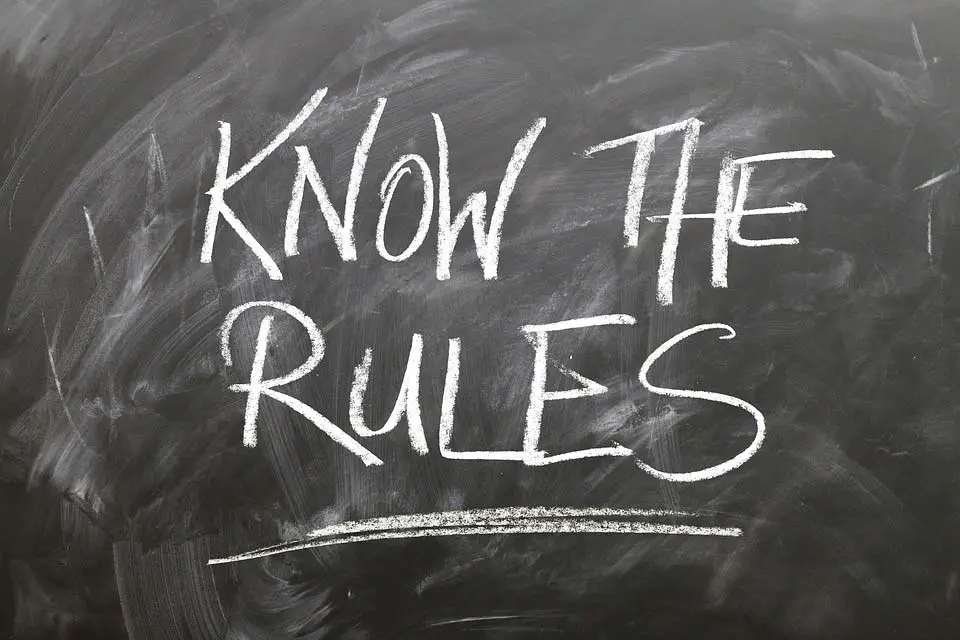![How To Deal With Sensory Overload [9 Tips For Overstimulation]](https://happyrubin.com/wp-content/uploads/2019/12/ik-ben-overprikkeld-150x150.jpg)
14 Tips To Communicate Clearer, Cleaner & Better

How can you communicate better, more clearly & effectively? For example in the workplace or with your partner? What are the best tips to improve your personal communication? What are the conditions for effective communication? Read on for effective communication techniques, tips, theories and examples…
Contents of this page:
Tip 1 – How can you communicate clearly, concisely and concisely? Record yourself!
Those people with long-winded, boring stories … we don’t really like them. They take up our precious time. How do you ensure that you do not become like those people?
Record yourself every day and hear yourself back. Listen how you talk.
- Am I coming to the point?
- Am I not straying?
- Do I talk in a structured way?
- Do I speak clearly, briefly and to the point without getting long-winded?
- What is the quality of my communication? For example, watch your ‘uhhhms’ or ‘actually’.
- Which words do I use?
- Am I credible and convincing or do I have a long-winded and boring story?
- Take the second and third position and give yourself feedback.
Practice is the keyword. Do this for several weeks or months. To make it easier and more fun, you can meet with some friends to post a video of yourself in a Whatsapp group every day. The handy thing about this is that with Whatsapp you can only send videos of two and a half minutes anyway. So you have to get to the point quickly! You could also start a public vlog.
Tip 2 – Set up a clear ‘frame’… In other words: be good at managing expectations

Managing expectations is the ultimate form of clear communication. This means that you state in advance what will and will not happen. For example, you ensure that there is no chance that people will have to find out later that they are not going to get something they had hoped for.
When everyone knows in advance what he / she can expect and what he / she absolutely cannot expect, no unpleasant surprises can arise.
Concrete examples?
Let a customer know clearly in advance which responsibilities, tasks and end results do and do not fall under the assignment.
Always let volunteers know in advance which expenses they can or cannot declare.
I always let potential guest bloggers know in advance that there is a chance that I will reject a guest article. I also let them know that they certainly cannot expect to get a lot of website visitors.
Do you see the importance of communicating everything clearly in advance ? In particular communicating the limitations is very important. Do you want to communicate openly and honestly? Then it makes little sense to do that afterwards. The sooner the better.
Tip 3 – Recognize when you use concrete and abstract words: make sure you have a good mix

First, let’s take a look at what is abstract and concrete :
- Abstract words are for example: ‘innovation’, ‘processes’ and ‘development’.
- Concrete (er) words are, for example: ‘the new Iphone version’, ‘drawing with AutoCAD software’ and ‘adding a new function’.
After you have talked three sentences in a row in extremely abstract terms, follow it up with a few sentences with concrete examples. Otherwise, you run the risk of becoming an office language monster.
A handy tool for switching between more concrete and more abstract words is the chunking model.
Tip 4 – Often remind people of the (initial) goals of the conversation
By often making a link to the goals / intentions of the conversation, you not only ensure that it does not become an aimless conversation, but it also makes it easier to reach agreement. Just remember what the joint intention is:
- “We’re here at …”
- “We both want that …”
- “Our goal here is that …”
You can read more about this in this negotiation model.
Tip 5 – Mention the intention behind why you are saying something
As you read in the previous tip, a conversation can have a purpose – that is, intention. The same goes for individual sentences in a conversation. Every sentence can have an intention.
A boss may say, “We have to empty that room,” but if the intention is not clear, confusion can arise and these are not cheap jokes. For example, the employee who hears that he must empty the room, can tidy everything up and get it ready because he thinks that this room will soon be used by a group of well-paying customers, while the boss’s intention was to make space available to temporarily store some stuff in it.
So a sentence can mean different things, and you can make the correct meaning extra clear by stating the intention.
Tip 6 – Let us know if you can no longer follow the other person

Were you unable to follow the other person’s story? Or is it so loud in the environment that you have not heard what the other was saying? Never let it pass just like that, but always ask the other to repeat it until you understand what the other wanted to say.
We are naturally ‘afraid’ to show that we were not paying attention. We are also afraid to ‘bother’ someone with the question whether the other person can explain it again, in a different or perhaps clearer way.
What do you have to do then? Do ask the other person to repeat it – and that can safely be done in the imperative mood (‘Repeat the latter for a while’). Because otherwise there will not only be miscommunication, but also a dent in the ‘connecting feeling’ between you, which is also called rapport .
Maybe you just walked to your office with a business relation so you could write down and print some things. Your attention is then fully focused on writing and printing correctly. If in the meantime your business relation is telling an anecdote, but you did not receive the story and the clue – because you were arranging something for that business relation – then be honest that you did not follow the whole story because you did something for him / was arranging her.
That is much better than letting that important business relationship walk away with the feeling that you were not listening, while he / she also thinks that you were busy with all kinds of other things.
Tip 7 – Communication = checking: check with the other person!
Checking is very important in communication. Otherwise, you can assume, for example, that the other person is following your story, when they are not and you are wasting your time with the rest of your story.
In the previous tip we already learned that we can safely ask the other person to clarify something. Also know that others often do not dare to do this to you. Help them by just checking. This is the TOTE philosophy : only continue when you know it is possible.
Think of ANNA: Inquiring Everything, Accepting Nothing.
Also check your assumptions about others. You may already know that you should not fill in for someone else , but if you choose to make an assumption anyway, then at least do a check with the other.
The following sentence is full of assumptions that should have been checked in advance:
‘You were dissatisfied. That feeling belongs to you. I understand that you don’t want to say anything about it and that you want to leave now. ‘
This sentence would have been good if the other person had said it literally like that, but if this is your own conclusion / assumption, then it is very unpleasant for the other person to hear.
Before making those conclusion (s), it is good to check whether the other person might have the need to explain her reaction. Moreover, ‘that feeling belongs to you’ is just your opinion – and even for the most correct view such as ‘We are all equal’, everyone believes something different , so don’t just make an assumption without a check.
Clarify & verify. Also check if you have understood other people’s messages.
It is also useful to do a check on the other before you want to make a decision, make a decision and guide others in this. Just look at the example below:
Suppose you want to decide during a team exercise to switch exercise partners. Instead of immediately saying, “Come on, let’s switch”, do a check by asking: “I now estimate that it is nice to switch – what do you think?”
Tip 8 – Prepare what you want to say or ask

For example, if you come to a meeting, prepare what you want to say or what you want to ask. Think in advance about your requests for help and how you can best summarize what you have been doing recently. This makes your communication super sharp, short and to the point. If you have to think about it, it will soon become a long-winded story.
Tip 9 – Communicate clearly? Then give concrete feedback
We provide feedback continuously throughout the day. However, feedback is often very woolly and unstructured. Clear communication means giving clear feedback. Read here how to give concrete, sensory feedback.
Tip 10 – Getting the message across clearly? Let all your sentences be open to only one interpretation

Many words are open to multiple interpretations. The most clearly communicating people are always aware of the potential for generalizations, omissions and distortions in their communication. This is especially important with written communication.
What goes wrong in the quote from an email below?
“We don’t post the same content as another website because of Google SEO.”
The above sentence could mean that Google SEO is the reason, or it could mean that Google SEO is not the reason. Usually you will only encounter these pitfalls in communication if you read your mail again.
All words in the message must be capable of one meaning : no gross generalizations, distortions, and omissions are allowed when assigning tasks. If you detect a potential generalization, distortion or omission, provide an explanation to specify it.
- Let the other person know whether the task needs to be accurate and qualitative, or whether it needs to be done quickly without having to be of high quality.
- Give an indication of the maximum number of hours that can be spent on it.
- TOTE : don’t just let the other person start the task, but let him / her tell you what steps he / she will take and give it a go. This prevents the other person from thinking about doing an activity for hours that actually does not yield anything.
If you apply these principles, you will end up with the following job description, for example:
Attached you will find 5 vacancies / project descriptions for internships. Can you submit this to as many universities and colleges as possible by Friday 6 May at the latest? Always mention me as a contact person, to be reached by e-mail and by telephone.
I think it will take about 6 hours to register them at 20 colleges and internship banks. Send me an email with the steps you are going to take. Then I will give it a go.
Feel free to let us know if you have any questions.
Tip 11 – Want to communicate better? Speak Loud

An open door that needs to be mentioned, because volume is the essence of communication. People who don’t speak loud enough by definition communicate poorly. If the other person cannot understand you, the message will not get across at all.
Talking loudly has many advantages: you prevent miscommunication, you prevent frustration from others who have difficulty hearing you and you no longer come across as an insecure person who does not dare to speak up. So yes, this also has a direct effect on your charisma . Speaking of charisma … see next tip!
Tip 12 – Better communication in the workplace? Talk with charisma
In many jobs, your added value is largely that you open your mouth. If you decide to talk, you will actually bring added value if you convey your message with charisma. Then you bring something valuable. Without conviction and charisma, the recipients are not sure what to do with the message, or whether to accept it at all.
Metaphorically, 7% of your communication is related to your words. The words themselves are secondary to how you tell them. Tell them with passion. With emotion!
Concrete elements of a charismatic transmission of a message:
- Deep breathing.
- Breathing from the abdomen.
- A low voice.
- A slow pace of speech.
- A soft voice.
- A high volume.
- Looking at people while you talk to them.
You can find more charisma tips here.
Tip 13 – Do not ask long-winded and woolly, but clear and concrete questions
Asking good questions is a sign of good communication. How do you ask good questions? Pay attention to the following points of attention:
- Don’t tell a story, ask a question.
- Break down all the words that appear in your question. For example, if you ask how you can experience more freedom, explain what freedom specifically means to you. You can use the meta model as an aid for this .
- Do not ignore the purpose with your question. Take, for example, the following question: “How should you appear well-groomed during a job application while not caring too much about what others think about you?” This is a question that clings to the conflict between the principles of ‘personal care’ and ‘care less about things’. This question completely misses the point. Don’t stick to those principles. Make sure you fix the situation: the goal is to get the job so do whatever it takes to get that job. If neat clothes and a haircut contribute to that, then you just do.
- Don’t make your question too complex.
Here you will learn more about asking good questions.
Tip 14 – Read these books about better communication
Finally, view the top 10 books about better communication here.
To your success!

![5 Best Self Care Tips For College Students [#1 Advice]](https://happyrubin.com/wp-content/uploads/2021/09/the-best-self-care-tips-for-college-students-440x264.jpg)
![How To Stick To New Year’s Resolutions: 9 Tips [Smart & Sure Ways]](https://happyrubin.com/wp-content/uploads/2019/12/tips-voor-goede-voornemens-440x264.jpg)
![How To Stop Being So Hard On Yourself [9 Great Tips]](https://happyrubin.com/wp-content/uploads/2019/12/we-moeten-zoveel-van-onszelf-en-anderen-150x150.jpg)

![19 Best Ice Breaker & Get-To-Know-Eachother Games [Fun & Simple]](https://happyrubin.com/wp-content/uploads/2018/02/leukste-ijsbrekers.jpeg)
![Becoming More Social: 41 Tips [Improving Social Skills] [List]](https://happyrubin.com/wp-content/uploads/2018/06/sociale-vaardigheden1.jpeg)
![How to start a conversation with anyone: 15 tips [Making contact]](https://happyrubin.com/wp-content/uploads/2017/08/gesprekstechnieken1.jpeg)
![372 Friend Tag Q&A Questions [Best Friend Quiz]](https://happyrubin.com/wp-content/uploads/2019/05/best-friend-tag-vragen-voorbeelden.jpg)



![Clingy & controlling behavior of partner/date [Extreme examples]](https://happyrubin.com/wp-content/uploads/2020/06/claimerig-gedrag-van-partner-eigenschappen-en-voorbeelden-150x150.jpg)

![How to recognize if a man is in love [Signals & his body language]](https://happyrubin.com/wp-content/uploads/2020/05/verliefd-gedrag-van-mannen-herkennen-150x150.jpg)


![Free will and religion / theology [Verses & Quotes on free will]](https://happyrubin.com/wp-content/uploads/2020/10/religion-on-free-will-quotes-1050x640-1-150x150.jpg)

![Dealing With Setbacks & Hardship [Lessons & Examples]](https://happyrubin.com/wp-content/uploads/2018/11/omgaan-met-tegenslag-tips-hoe-dan.jpeg)
![NLP Agreement Frame: Use these exact sentences [Examples]](https://happyrubin.com/wp-content/uploads/2020/10/agreement-frame-nlp-1125x640-1-440x264.jpeg)
![122 Best Comebacks In Any Situation [Best Examples]](https://happyrubin.com/wp-content/uploads/2020/06/beste-comebacks-technieken-tips-440x264.jpg)
![Using Hypnosis to Stop Smoking [HowTo]](https://happyrubin.com/wp-content/uploads/2020/05/stoppen-met-roken-door-hypnose-150x150.jpg)
![Presuppositions language pattern: meaning & examples [NLP]](https://happyrubin.com/wp-content/uploads/2020/04/wat-zijn-vooronderstellingen-150x150.jpg)
![Peripheral Vision: Meaning & Exercise [Essential Skill]](https://happyrubin.com/wp-content/uploads/2020/04/perifeer-zicht-trainen-tips-150x150.jpg)

![How To Start A Coaching Business [21 Smart Tips]](https://happyrubin.com/wp-content/uploads/2018/11/coachingpraktijk-starten-tips.jpeg)
![How to make dreams come true? [33 tips to realize dreams 100%]](https://happyrubin.com/wp-content/uploads/2018/05/dromen-mijlpalen.jpeg)
![How To Become Rich? 27 Millionaire Tips [Guaranteed To Work]](https://happyrubin.com/wp-content/uploads/2018/01/hoe-kan-ik-rijk-worden.jpeg)
![77 Best Online Marketing Tools [Recommendations] [Also Free]](https://happyrubin.com/wp-content/uploads/2018/08/beste-onlne-marketing-tools-tips.jpeg)
![Complete List Of Virtues & Qualities [Including Explanation]](https://happyrubin.com/wp-content/uploads/2018/12/kernkwaliteiten-uitleg.jpeg)
![Being Attentive: How Do You Do That? [Meaning & 9 Tips]](https://happyrubin.com/wp-content/uploads/2019/05/attent-zijn.jpg)
![Being Conscientious: Meaning Of This Virtue [Explained]](https://happyrubin.com/wp-content/uploads/2018/07/Consciëntieus-persoon.jpg)


![Best Books About Burn-Out [Top 10] [Update 2025]](https://happyrubin.com/wp-content/uploads/2020/06/beste-boeken-over-burnout-lijst-440x264.jpg)
![Best Self-love Books [Top 10] [Update 2025]](https://happyrubin.com/wp-content/uploads/2020/04/beste-boeken-over-zelfliefde-aanraders-440x264.jpg)
![Life changing books: 10 books that change your life [2025 Update]](https://happyrubin.com/wp-content/uploads/2020/03/levensveranderende-boeken-tips-150x150.jpg)
![Top 10 Best Books: Recommendations Per Genre [2025 Update]](https://happyrubin.com/wp-content/uploads/2019/12/best-books-per-genre-150x150.png)
![Best Books On procrastination: Must Reads [List] [2025 Update]](https://happyrubin.com/wp-content/uploads/2019/11/beste-boeken-over-uitstelgedrag-tips-150x150.jpg)
![Joe Dispenza: Events To Attend [2025 & 2026] [All Info]](https://happyrubin.com/wp-content/uploads/2020/02/joe-dispenxa-events-440x264.png)
![Best Online Study Options [Online Education Top List]](https://happyrubin.com/wp-content/uploads/2019/03/best-home-study-options-440x264.png)
![Teachable Review & Experiences 2025 [Bad Online Training Tool?]](https://happyrubin.com/wp-content/uploads/2020/02/Teachable-review-ervaringen-150x150.png)
![Audible Review, Experiences & Special Discount [Scam?]](https://happyrubin.com/wp-content/uploads/2020/01/audible-review-ervaringen-150x150.png)
![Guest Posts Wanted [Free & Always Directly Accepted]](https://happyrubin.com/wp-content/uploads/2019/05/gastbloggen-regels.jpg)
